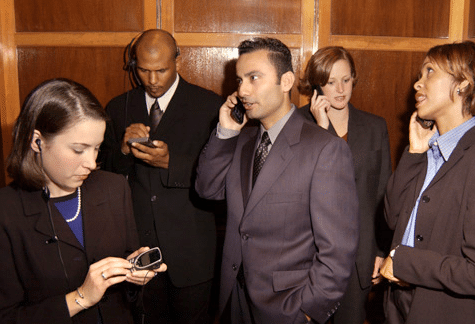Internet locks people in their own private echo chambers
By C. Thi Nguyen
Something has gone wrong with the flow of information.
It’s not just that different people are drawing subtly different conclusions from the same evidence. It seems like different intellectual communities no longer share basic foundational beliefs. Maybe nobody cares about the![]() truth anymore, as some have started to worry. Maybe political allegiance has replaced basic reasoning skills. Maybe we’ve all become trapped in echo chambers of our own making – wrapping ourselves in an intellectually impenetrable layer of like-minded friends and web pages and social media feeds.
truth anymore, as some have started to worry. Maybe political allegiance has replaced basic reasoning skills. Maybe we’ve all become trapped in echo chambers of our own making – wrapping ourselves in an intellectually impenetrable layer of like-minded friends and web pages and social media feeds.
But there are two very different phenomena at play here, each of which subvert the flow of information in very distinct ways. Let’s call them echo chambers and epistemic bubbles. Both are social structures that systematically exclude sources of information. Both exaggerate their members’ confidence in their beliefs. But they work in entirely different ways, and they require very different modes of intervention. An epistemic bubble is when you don’t hear people from the other side. An echo chamber is what happens when you don’t trust people from the other side.
 Current usage has blurred this crucial distinction, so let me introduce a somewhat artificial taxonomy. An ‘epistemic bubble’ is an informational network from which relevant voices have been excluded by omission. That omission might be purposeful: we might be selectively avoiding contact with contrary views because, say, they make us uncomfortable. As social scientists tell us, we like to engage in selective exposure, seeking out information that confirms our own worldview. But that omission can also be entirely inadvertent. Even if we’re not actively trying to avoid disagreement, our Facebook friends tend to share our views and interests. When we take networks built for social reasons and start using them as our information feeds, we tend to miss out on contrary views and run into exaggerated degrees of agreement.
Current usage has blurred this crucial distinction, so let me introduce a somewhat artificial taxonomy. An ‘epistemic bubble’ is an informational network from which relevant voices have been excluded by omission. That omission might be purposeful: we might be selectively avoiding contact with contrary views because, say, they make us uncomfortable. As social scientists tell us, we like to engage in selective exposure, seeking out information that confirms our own worldview. But that omission can also be entirely inadvertent. Even if we’re not actively trying to avoid disagreement, our Facebook friends tend to share our views and interests. When we take networks built for social reasons and start using them as our information feeds, we tend to miss out on contrary views and run into exaggerated degrees of agreement.
An ‘echo chamber’ is a social structure from which other relevant voices have been actively discredited. Where an epistemic bubble merely omits contrary views, an echo chamber brings its members to actively distrust outsiders. In their book Echo Chamber: Rush Limbaugh and the Conservative Media Establishment (2010), Kathleen Hall Jamieson and Frank Cappella offer a groundbreaking analysis of the phenomenon. For them, an echo chamber is something like a cult. A cult isolates its members by actively alienating them from any outside sources. Those outside are actively labelled as malignant and untrustworthy. A cult member’s trust is narrowed, aimed with laser-like focus on certain insider voices.
In epistemic bubbles, other voices are not heard; in echo chambers, other voices are actively undermined. The way to break an echo chamber is not to wave “the facts” in the faces of its members. It is to attack the echo chamber at its root and repair that broken trust. Let’s start with epistemic bubbles. They have been in the limelight lately, most famously in Eli Pariser’s The Filter Bubble (2011) and Cass Sunstein’s #Republic: Divided Democracy in the Age of Social Media (2017). The general gist: we get much of our news from Facebook feeds and similar sorts of social media. Our Facebook feed consists mostly of our friends and colleagues, the majority of whom share our own political and cultural views. We visit our favorite like-minded blogs and websites. At the same time, various algorithms behind the scenes, such as those inside Google search, invisibly personalize our search es, making it more likely that we’ll see only what we want to see. These processes all impose filters on information.
es, making it more likely that we’ll see only what we want to see. These processes all impose filters on information.
Such filters aren’t necessarily bad. The world is overstuffed with information, and one can’t sort through it all by oneself: filters need to be outsourced. That’s why we all depend on extended social networks to deliver us knowledge. But any such informational network needs the right sort of broadness and variety to work. A social network composed entirely of incredibly smart, obsessive opera fans would deliver all the information I could want about the opera scene, but it would fail to clue me in to the fact that, say, my country had been infested by a rising tide of neo-Nazis. Each individual person in my network might be superbly reliable about her particular informational patch but, as an aggregate structure, my network lacks what Sanford Goldberg in his book Relying on Others (2010) calls ‘coverage-reliability’. It doesn’t deliver to me a sufficiently broad and representative coverage of all the relevant information.
Epistemic bubbles also threaten us with a second danger: excessive self-confidence. In a bubble, we will encounter exaggerated amounts of agreement and suppressed levels of disagreement. We’re vulnerable because, in general, we actually have very good reason to pay attention to whether other people agree or disagree with us. Looking to others for corroboration is a basic method for checking whether one has reasoned well or badly. This is why we might do our homework in study groups, and have different laboratories repeat experiments.
But not all forms of corroboration are meaningful. Ludwig Wittgenstein says: imagine looking through a stack of identical newspapers and treating each next newspaper headline as yet another reason to increase your confidence. This is obviously a mistake. The fact that The New York Times reports something is a reason to believe it, but any extra copies of The New York Times that you encounter shouldn’t add any extra evidence.
But outright copies aren’t the only problem here. Suppose that I believe that the Paleo diet is the greatest diet of all time. I assemble a Facebook group called ‘Great Health Facts!’ and fill it only with people who already believe that Paleo is the best diet. The fact that everybody in that group agrees with me about Paleo shouldn’t increase my confidence level one bit. They’re not mere copies – they actually might have reached their conclusions independently – but their agreement can be entirely explained by my method of selection. The group’s unanimity is simply an echo of my selection criterion. It’s easy to forget how carefully pre-screened the members are, how epistemically groomed social media circles might be.
Luckily, though, epistemic bubbles are easily shattered. We can pop an epistemic bubble simply by exposing its members to the information and arguments that they’ve missed. But echo chambers are a far more pernicious and robust phenomenon.
_________________
To continuing reading this article at Aeon, click here.





















